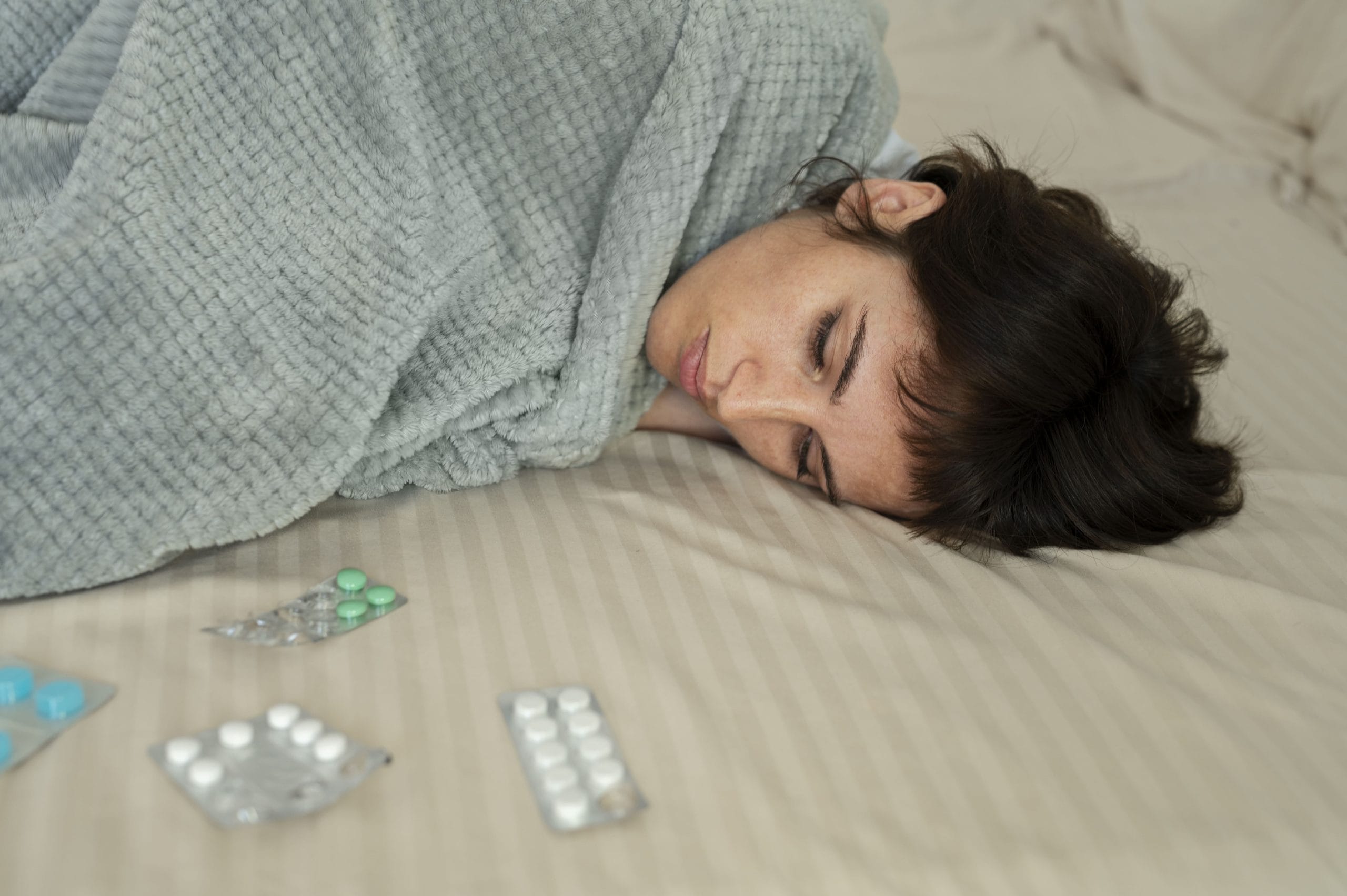Have you ever been awake at 2 a.m., tossing and turning after an infection? If so, you may wonder, can antibiotics cause insomnia? Yes, you are not alone. Many people don’t realize that antibiotics can lead to insomnia, and it’s a common issue.
Antibiotics are often seen as a cure for infections. But could they also lead to sleepless nights?
When side effects become overwhelming, consult the expert team at Ballem Harmony Clinic. They are always there to help. So, make your health feel balanced, clear, and not confused.
So, Do Antibiotics Give You Insomnia?
Short answer? They can.
While not everyone experiences it, plenty of people report insomnia from antibiotics. You may find yourself wide awake, restless, or even dealing with weird dreams and broken sleep.
But why does this happen?
Some antibiotics can stimulate your central nervous system (CNS). They do more than fight bacteria; they also interact with your brain’s sleep-wake cycle. So, the big question is can antibiotics affect sleep? For many people, the answer is a clear yes.
Spotlight on Trouble: Levofloxacin Insomnia
If you’ve been prescribed levofloxacin and suddenly can’t sleep, you’re not imagining things.
Levofloxacin Insomnia isn’t just annoying; it disrupts your sleep. This fluoroquinolone travels through your bloodstream and affects your brain. The result? A restless night. While it fights bacteria, it can steal your restful sleep.
Can levofloxacin steal your peace of mind? Yes, it can. It may cause anxiety, restlessness, confusion, or even vivid hallucinations. Though these side effects are rare, they can happen.
Some compare it to having a strong coffee right before bed.
What Antibiotics Cause Insomnia?
You’d be surprised how many might affect your sleep
It’s not just levofloxacin. Here are a few others that have been linked to sleep issues:
· Ciprofloxacin: Another fluoroquinolone like levofloxacin
· Doxycycline: Often used for skin and respiratory infections
· Clarithromycin: Sometimes causes vivid dreams or anxiety
· Amoxicillin: Usually well tolerated, but some report restlessness
Many antibiotics can cause insomnia. However, it really depends on your body and its reactions.
Why Do Antibiotics and Sleeplessness Go Together?
Here’s the science (we’ll keep it light):
1. Neurotransmitter interference: Some antibiotics may mess with how your brain produces or regulates chemicals like dopamine or GABA, which help you relax and sleep.
2. Inflammation and immune response: Your body is fighting off an infection and processing medication—it’s a lot. That internal chaos can interrupt normal sleep cycles.
3. Gut microbiome changes: Antibiotics wipe out bacteria—good and bad. This can affect your gut-brain connection and indirectly cause antibiotics sleeplessness.
Personal Experiences: You’re Not Alone
You’re on day three of antibiotics. You’re finally starting to feel better—except now you can’t sleep. Sound familiar?
Lots of patients at Ballem Harmony Clinic tell us the same story. And honestly, feeling wide awake in the middle of the night when you’re supposed to be healing is incredibly frustrating.
We always remind our patients: it’s okay to ask, can antibiotics give you insomnia? It’s not all in your head—it might actually be the meds.
Tips to Beat Insomnia from Antibiotics
If you’re dealing with antibiotics insomnia, here are a few things you can try before tossing your pillow across the room:
1. Take your antibiotics earlier in the day
If your doctor says it’s okay, try moving your dose to the morning instead of taking it at night.
2. Ditch the caffeine
Caffeine + stimulating antibiotics = double trouble. Avoid coffee, tea, soda, and even dark chocolate after noon.
3. Power down electronics
Blue light from screens can make antibiotics sleeplessness worse. Give yourself at least 30 minutes of screen-free wind-down time before bed.
4. Try magnesium or calming teas
Chamomile, valerian root, or magnesium supplements may help. Just check with your doctor first, especially if you’re on multiple medications.
5. Talk to your doctor
Always, if you’re seriously sleep-deprived, it might be time to switch medications.
Can Antibiotics Affect Sleep Long-Term?
In most cases, no. The effects usually go away after you finish your prescription.
But some people are more sensitive. If you have anxiety, a sleep disorder, or are prone to side effects, antibiotics can definitely shake up your sleep for a few days or even weeks.
So, when someone asks, do antibiotics affect sleep, the answer is: they might, and it’s more common than you think.
When to Concern
If you’re not just struggling to sleep, but also feeling:
· Extremely anxious
· Confused or paranoid
· Seeing or hearing things that aren’t there
Stop the medication and call your doctor immediately. These rare but serious side effects, especially from levofloxacin, are worth acting on right away.
What to Ask Your Doctor
If you’re concerned about antibiotics and insomnia, bring it up at your next appointment. You can ask:
· “Is there a gentler alternative to this antibiotic?”
· “Could I take a lower dose or a different schedule?”
· “What can I take to help me sleep while I’m on this?”
And remember: you deserve sleep and healing. Not one or the other.
Final Thoughts: Can Antibiotics Cause Insomnia?
Yes! Antibiotics like levofloxacin, ciprofloxacin, and even doxycycline can mess with your sleep.
When asked if antibiotics cause insomnia, you will know the answer: yes, they can.
Sleep is important for recovery. If any of your medications are causing trouble for your sleep, reach out for help.
At Ballem Harmony Clinic, we believe healing should never come at the cost of your comfort. Our personalized care plans are built to support your whole health—mind, body, and yes, even sleep.
FAQs
1. Can antibiotics cause insomnia?
Antibiotics can disrupt sleep for some people. Certain types, especially those that affect the brain, may hinder restful sleep. While it’s not common, many individuals report insomnia as an unexpected side effect of these drugs.
2. What antibiotics cause insomnia?
More evidence links sleepless nights to levofloxacin and its peers. Ciprofloxacin, doxycycline, and clarithromycin are part of this issue too. These antibiotics disrupt neurotransmitter balance. They can even push your brain into overdrive, leading to insomnia’s unwelcome grip.
Why do antibiotics and sleeplessness go hand in hand?
Antibiotics can throw a wrench in your sleep cycle. They steal the serenity of your nights. Disrupting your nervous system, they create a restless ripple. Your gut microbiome, essential for restful rhythms, takes a hit. Keeping this balance is vital for good sleep.








No comment